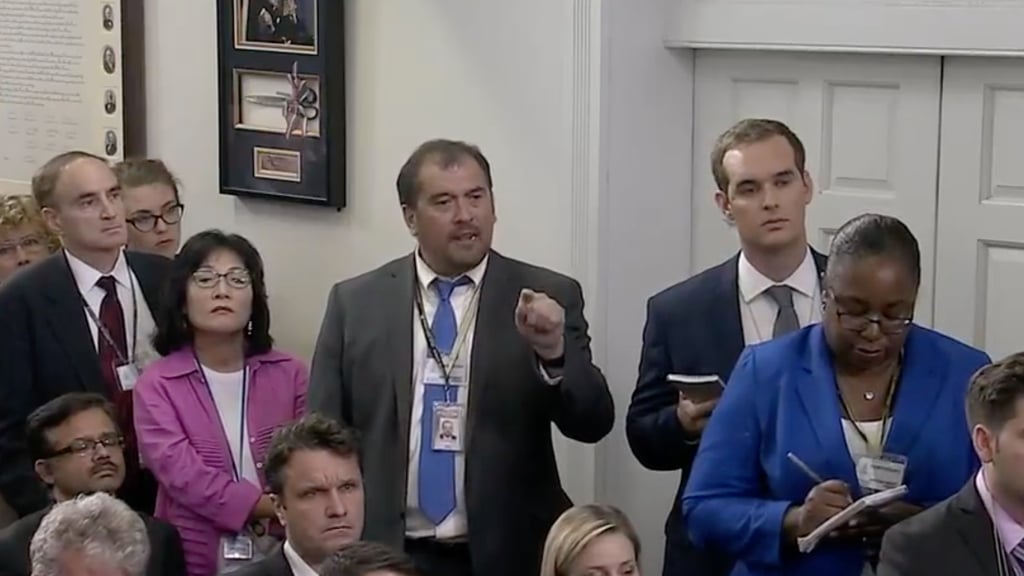The Montgomery County Sentinel might not be a household name when people think of White House coverage, but like many small publications, the suburban weekly that goes out to residents of DC’s northwestern suburbs has White House credentials. And on Tuesday, the paper got some big-time exposure when executive editor Brian Karem, who holds a hard pass, ripped into Deputy Press Secretary Sarah Huckabee Sanders after she accused media organizations of journalistic malpractice.
“I hope that outlets that have continued to use either unnamed sources, sometimes stories with no sources at all—we’ve been going on this Russia-Trump hoax for the better part of a year now with no evidence of anything,” Sanders said in response to a Breitbart question about a CNN story last week the network retracted and was followed by the resignations of three people who worked on the piece.
When another reporter asked Sanders if the White House really expected reporters to ignore allegations that a foreign power meddled in a US election, she again got defensive and accusatory. “If we make the slightest mistake, the slightest word is off, it is just an absolutely tirade from a lot of people in this room,” Sanders said. “But news outlets get to go on day after day and site unnamed sources, use stories without sources, have—you mentioned the [CNN] story—where they had to have reporters resign.”
That didn’t sit well with Karem, who scuttled his planned question to fire back at a White House that over the past few weeks, has curtailed the visibility of its daily press briefings.
“Sarah, come on,” Karem said. “You’re inflaming everybody right here and right now with those words. This administration has done that as well. Why in the name of heavens—any one of us, right, are replaceable, and any one of us, if we don’t get it right, the audience has the opportunity to turn the channel or not read us. You have been elected to serve for four years at least. There’s no option other than that. We’re here to ask you questions, you’re here to provide the answers, and what you just did is inflammatory to people all over the country who look at it and say, see, once again, the President is right and everybody else out here is fake media. And everybody in this room is only trying to do their job.”
Wow. This entire exchange at the WH briefing. Must watch. https://t.co/ZxEEe6e31P
— Bradd Jaffy (@BraddJaffy) June 27, 2017
The rant turned Karem, 56, from a little-known local journalist—who also writes a column for Playboy—with 450 Twitter followers into an internet star with 34,000 followers and a raft of media requests. Instead of asking Sanders his intended question about the Senate’s now-delayed attempt to repeal the Affordable Care Act, Karem became the voice of a White House press corps that has felt increasingly antagonized by a prickly administration.
“In effect, once again, it was the White House dumping on an entire profession,” Karem tells Washingtonian. “I respect lots of folks in the White House. I respect Sarah and [Press Secretary] Sean [Spicer] and what they do, but there seems to be no respect for what we do.”
Over the past few weeks—really since President Trump and company returned from a nine-day trip to the Middle East and Europe—the White House has cut down on its daily press briefings from the highly viewed sparring matches between reporters and either Spicer or Sanders. Before Tuesday, the White House blocked cameras at ten of 15 briefings so far this month, with only a few of them even allowing audio recordings.
Karem’s not the first reporter to grumble. CNN’s Jim Acosta has called Spicer “kind of useless” and has resorted to tweeting photos of his socks on days his camera crew is not allowed to capture a briefing. But Karem also doesn’t have the luxury of waiting for a post-briefing live shot to gripe; instead, he vented directly to the source.
“I’m just tired of being told we’re the problem,” Karem says. “We’re there to report. They’re the ones elected to office.”I’d like to have a productive relationship with the people in the White House, but I hope the name calling of the press stops.”
McClatchy’s Anita Kumar says White House briefings have become increasingly agitated since Trump returned from his late-May trip and the appointment of former FBI Director Robert Mueller‘s as a special prosecutor in the probe of the alleged ties between Trump’s campaign and Russia. “Even though the questions are always tense, it’s gotten worse because of the off-camera thing, especially for TV people,” Kumar says.
Before joining the Sentinel 13 years ago, Karem worked worked in television, including as a reporter for America’s Most Wanted and local television stations in Kansas and Texas. Like most reporters who give themselves an inadvertent star turn, Karem says he doesn’t want to be the focus of attention. “It’s not about me, it is about the issues,” he says.
But as righteous as Karem’s rant might have felt, its prospects for its intended targets taking it to heart are dismal. In Trump’s White House, the accusations of “fake news” and other broadsides against legitimate journalism begin at the top, often from a presidential Twitter stream that shows no signs of slowing up. After half a year of it though, Karem just wasn’t having any more of it today.
“It’s like when I tell my children don’t piss in my ear and tell me it’s raining,” he says. “You can only take so much. It was a visceral reaction. After six months it gets to you. I’m only human.”




















